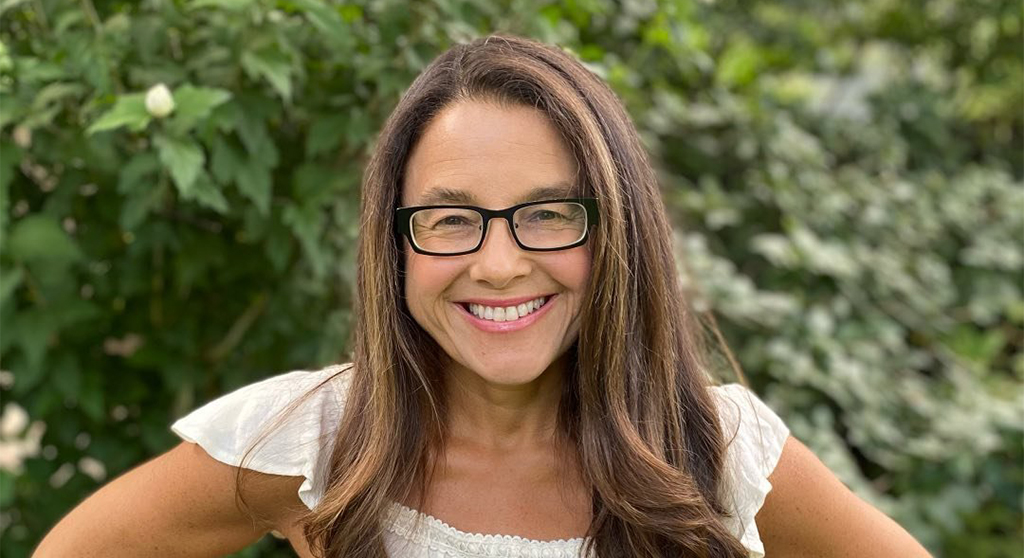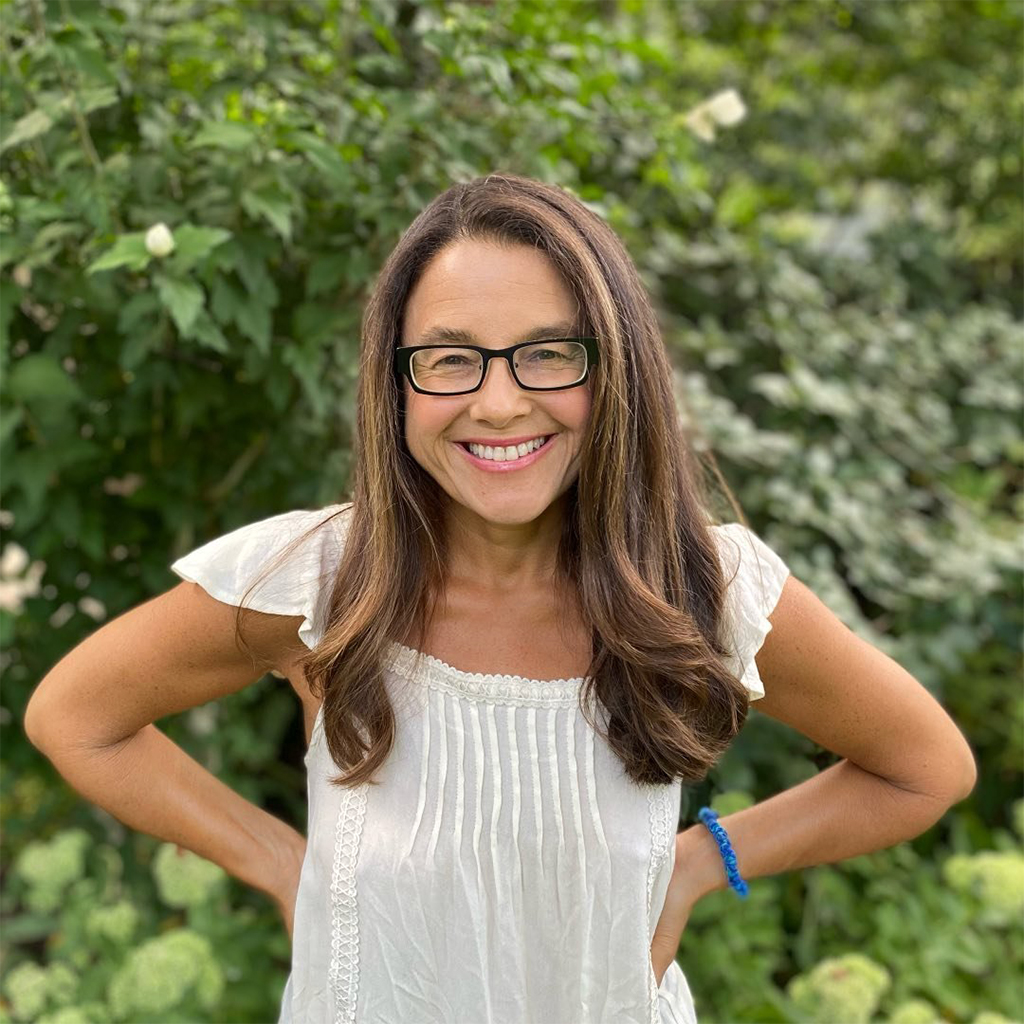

Author Rachel Zimmerman reads Monday from the memoir “Us, After.” (Photo via the author’s social media)
When Rachel Zimmerman’s husband died by suicide in 2014, her first instinct was, as a journalist, to ask why. A former health reporter for WBUR and staff writer for The Wall Street Journal, where her expertise was in health and medicine, she now writes about mental health for The Washington Post. After her husband Seth Teller – a robotics professor at the Massachusetts Institute of Technology and devoted father to their 8- and 11-year-old daughters – jumped to his death from the Tobin Bridge, she interviewed doctors, suicide researchers, even a man who jumped from the same bridge and lived. Those interviews are part of her debut book, “Us, After: A Memoir of Love and Suicide,” about how she and her daughters went on, after, that combines her research with a decade of reflection. “Us, After” comes out today, and Zimmerman speaks at Porter Square Books on Monday and at the MIT Press Bookstore on July 8. We interviewed Zimmerman on June 24; her words have been edited for length and clarity.
![]()
At what point did you start looking into Seth’s death like a journalist, and what did you learn?
I’ve been a journalist for more than 25 years, mainly writing about health care, health and medicine, and I’ve been a writer much of my adult life, so I understand the world through writing about it. Shortly after Seth died, actually only days later, I had the thought that although it’s terrible this is my story, there is a story here. That was the seed of thinking about this major turning point in my life and my kids’ lives as something to write about. It’s been 10 years since his death, and it took me many of those years to figure out the best form for the story. I wanted it to feel like a personal narrative, but because I’ve been a journalist for so long, it was in my nature to try to figure out what had happened by speaking to experts and reading research studies. In the book, I tried to combine both: I wanted it to be predominantly my story, but I also included interviews that unlocked some of the mysteries.
So, what did I learn? It’s very normal after a suicide to ask what you could’ve done or how you could’ve stopped it, but one thing I learned was that he had an illness in his brain and there was nothing we could have done. I 99.9 percent believe that. Seth was very high-functioning: He was a tenured robotics professor at MIT for 20 years, he was very close to his family and to his kids, he had friends and was part of communities. He was very good at hiding his illness, and I do believe that it’s an illness, just like cancer. No one chooses cancer, and Seth didn’t choose to have this illness that ultimately led to his death. I’ve also learned that we are not good at all at predicting who will complete a suicide out of the many millions of people who have depression and other mental illnesses. And I’ve learned that he did not have many of the more well-known hallmark signs of someone who dies by suicide: He didn’t have a history of self-harm and had never been diagnosed with any major mental illness. But he was struggling. In the weeks before he died, he had ringing in his ear, his sleep was majorly impacted, he had sciatica which meant he couldn’t play ultimate frisbee, which he loved, and he was really stressed about an international robotics competition he was involved in. He was not a person who asked for help, because he was a person who people came to to ask for help, and so when things got bad for him, he didn’t get the help he needed in time. That’s the biggest thing I learned: It’s a sign of strength to ask for help, not a sign of weakness.
Did you always know there’d be a book?
I thought there was a story early on, but I didn’t know it would be a book. A doctor I knew started a nonprofit that focuses on stories of patients who are going through severe illness or trauma, and two months after Seth died, she started recording me talking about what had happened. I recorded what was going on, how I felt, my fears and anxieties, and my grief and how it evolved. A few years later, I listened to those tapes again, and I could hear a difference between how I sounded at the beginning – my voice was lower and gravelly, I didn’t complete sentences, and I rambled – but by the end, my voice was calmer. I had a more thoughtful, grounded and coherent way of talking about it. When it happened, I thought we would never recover, but after that first year, I felt a little better and I felt different. That’s when I realized this could be a book that shows other people who have experienced trauma and loss that it does get better. Not everyone has had someone close to them die by suicide, but so many people have experienced loss of one kind or another, and yet it’s so often still stigmatized. I wanted to tell this story because I wanted to show people that we survived it, even though I didn’t think we could go on, and also that it’s okay to talk about these things. The day he died, my older daughter asked me if we would ever be happy again. I said yes, but I didn’t believe it. But since then, I’ve gotten remarried, and my girls are thriving. They’re okay. I wanted to share that with people who feel like they’ll never be happy again, so they can know that they can and they will.
Did you find the writing helpful in your grieving process?
It did help me think through what had happened, and there was some catharsis in writing it, but I don’t think of the book as therapy. I think it’s an issue with memoir in general: It’s one thing to have an experience, but it’s another to write a story that is separate from you about that experience. Once I got everything down on paper, I had to turn myself and my kids and everyone around us into characters, I had to create a narrative arc, and I had to decide what to include and what not to include. When you write a memoir you have to create a piece of literary nonfiction that stands on its own and is more than just a very long journal entry. Even though writing about what had happened had been helpful to me, turning it into a book was an entirely separate process.
What do you hope people will take from “Us, After”?
I mentioned one specific lesson: It’s a sign of strength to ask for help, not a sign of weakness. I hope that people will know that if something like this happens to them, there is light in the future. While you may not feel like you’ll ever be happy again, chances are through time, connecting with community, and a lot of patience, things will get better. I think we’re a lot more resilient than we think we are. But I also think it’s okay to feel what you feel, and that people need to allow their grief to evolve in organic ways. I hope this story gives people permission to do that.
And is there anything you gained from writing it that you think will stick with you?
I let my kids read the manuscript before I sent it out to be published, and I offered them full veto power to change their names or anything else, but they didn’t want to. They’re proud of it, which is a relief, and also makes me really proud of them. The whole thing is in many ways a love letter to them – when he died, I didn’t know how they would go on, and now they’re these exquisite young women. The fact that they’ve supported my writing about it is really important to me, and I think the biggest thing I’ve gained is the knowledge that people’s stories matter. You always ask yourself who am I to write this story, but I think it’s human to share stories and it makes us feel more connected with other people. That’s what I’ve gained from this journey, and if it can help anybody feel better or more hopeful, I’m satisfied.
Rachel Zimmerman reads Monday from the memoir “Us, After: A Memoir of Love and Suicide” in conversation with Alysia Abbott at 7 p.m. Monday at Porter Square Books, 25 White St., Porter Square, Cambridge. Free. Information is here.







